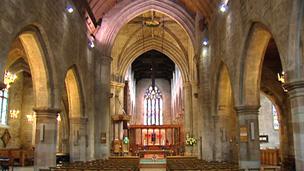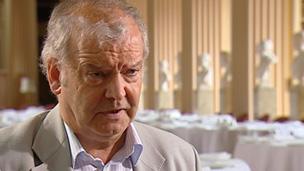The revolution which created the Church of Scotland
- Published

Church of Scotland membership has reduced over the years
It's the 450th anniversary of the ending of the session of the Scottish Parliament which brought about the Reformation.
The supremacy of the Roman Catholic Church was ended when it was replaced by the Calvinist Confession of Faith.
When members of the Scots Parliament ended their session on 24 August, 1560, they had created a revolution.
Earlier that year they had passed the Papal Jurisdiction Act, ending the Catholic dominance of Scotland, which the legislation said had been "verray hurtful and preiudiciall to our souerainis autoritie and commone weill of this realme."
To underline this, the parliament had also passed the Confession of Faith Ratification Act, which introduced Calvinism to Scotland - "heilsome and sound doctrine groundit vpoune the infallibill trewth of godis word."
The legacies of that Reformation continue to be felt throughout Scotland and within the Scots diaspora which took the Presbyterian faith with them across the world.
One of aims of the 16th Century reformers was a school in every parish and although they failed to achieve that, they laid the ground for Scotland's education system.
Connected to this was an aspiration for universal literacy so the people could read the Scriptures for themselves. It led to the establishment of a vibrant Scottish printing industry.
Professor Tom Devine of Edinburgh University believes education and literacy were the foundations of the explosion of radical thinking expressed in the 18th Century Enlightenment.
Baptisms fallen
He calls it a "world class development" in science, philosophy, literature, archaeology and architecture.
Professor Devine added: "There's a relaxation of the Puritanism of the Kirk in the early 18th century and that allows, what I would call almost the intellectual forces associated with Calvinism to come to the top."
But today the Church of Scotland, founded with such lofty ideals, looks to be a kirk in crisis.
Membership has fallen by more than two-thirds in the past 40 years. The number of baptisms, which could indicate future members, has plunged from almost 17,000 in 1991 to just over 6,000 in 2009.
Church historian, Professor Callum Brown of Dundee University has charted the decline of the kirk.
He said: "Since 1963 the Church of Scotland has suffered a straight line graph of decline in its adherence.
"This decline has been sustained and at the moment is showing absolutely no sign of changing."

Tom Devine is a professor at Edinburgh University
In 1980 a report to the Kirk's Council of Ministry predicted the reduction in membership - and in 1997 the church suggested that if the decline in numbers continued, it would cease to exist by 2033.
The Moderator of the General Assembly of the Church of Scotland, the Right Reverend John Christie admits he is concerned about the fall in formal adherence.
He says this is a reflection of society in general, but remains optimistic that the church will continue to exist.
He added: "I don't think there's a chance of the Church of Scotland withering away, I think that the Church of Scotland will change, it will continue to reform.
"The loss of the Church of Scotland would leave a very major space within the fabric of our society which would be, in my view, and you'd expect me to say this, difficult to replace in any kind of coherent way."
Nevertheless, the Kirk has significant challenges to face in the future.
Changing times
The number of trainee ministers has fallen from 67 in 2006/07 to just 41 in 2009/10, and the General Assembly has been told the church's deficit is £5.1m.
This has led to calls for churches to be closed and the number of ministers to be reduced, with some parishes merging.
The Reformation gave Scotland a new character and a new direction.
The country has changed since those revolutionary times - and it is clear the church must change too, if it is to continue to speak for the nation.
BBC Scotland Investigates: A Church in Crisis? will be broadcast on BBC1 Scotland at 2235 BST on Tuesday.
- Published22 May 2010